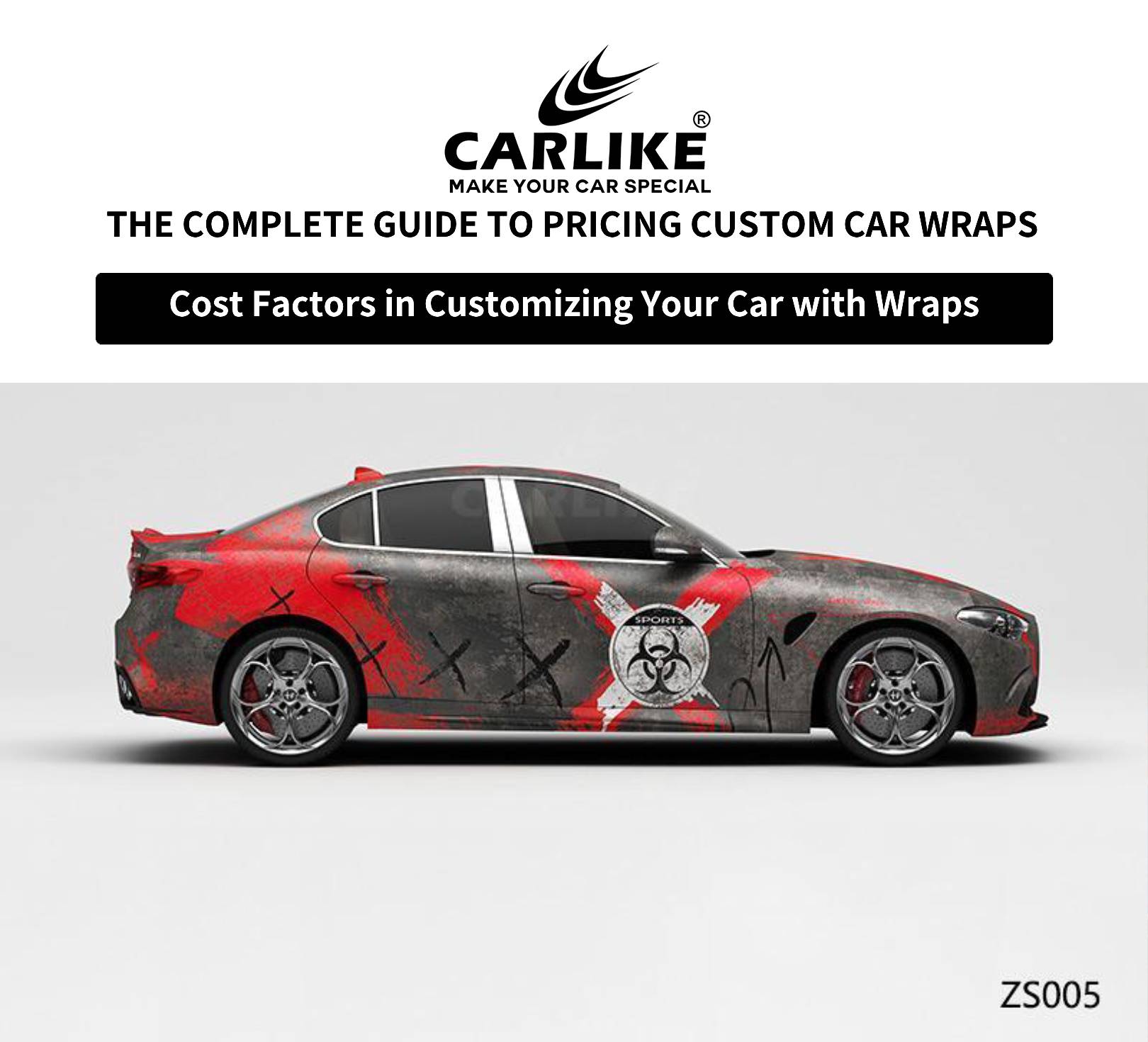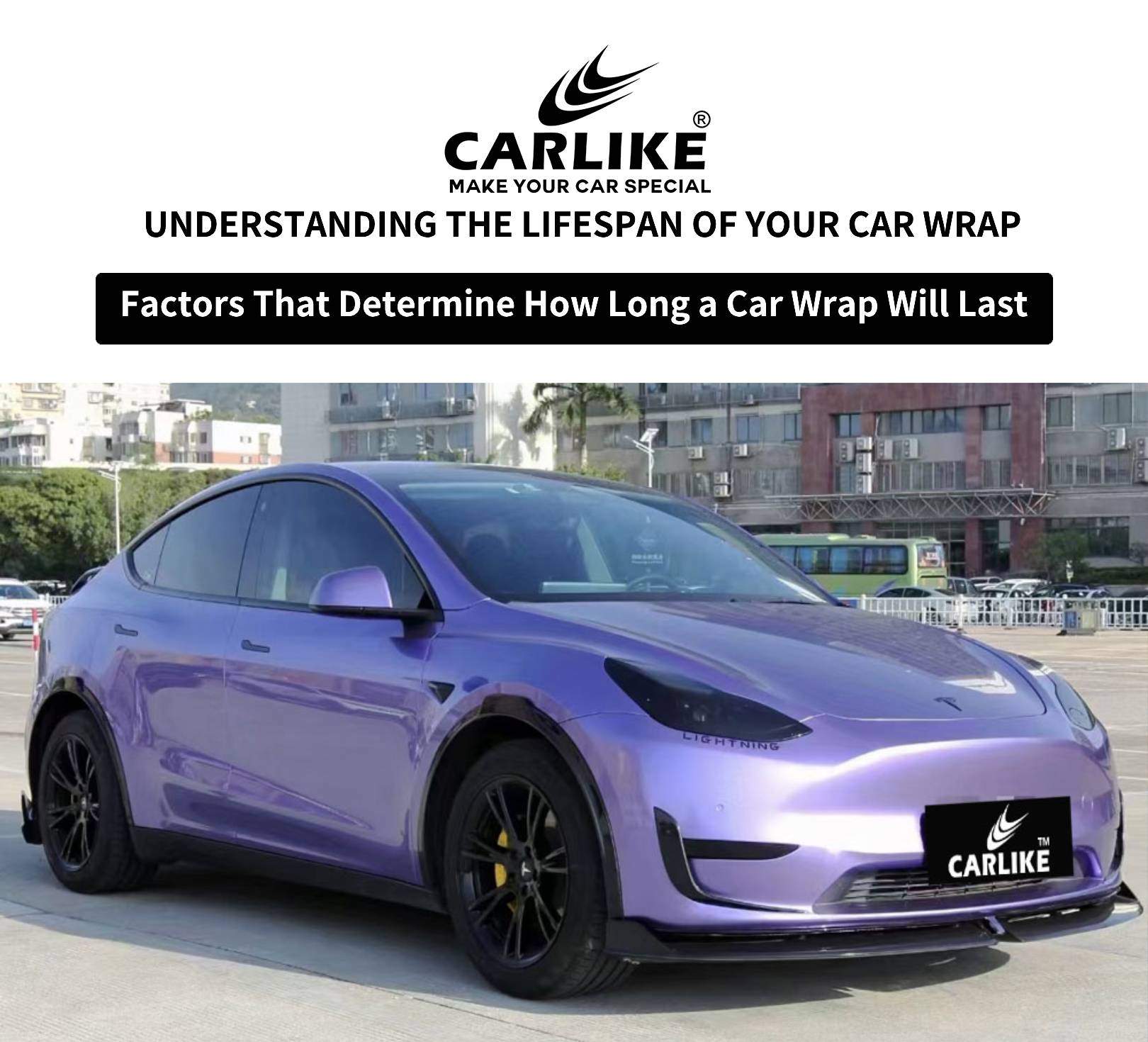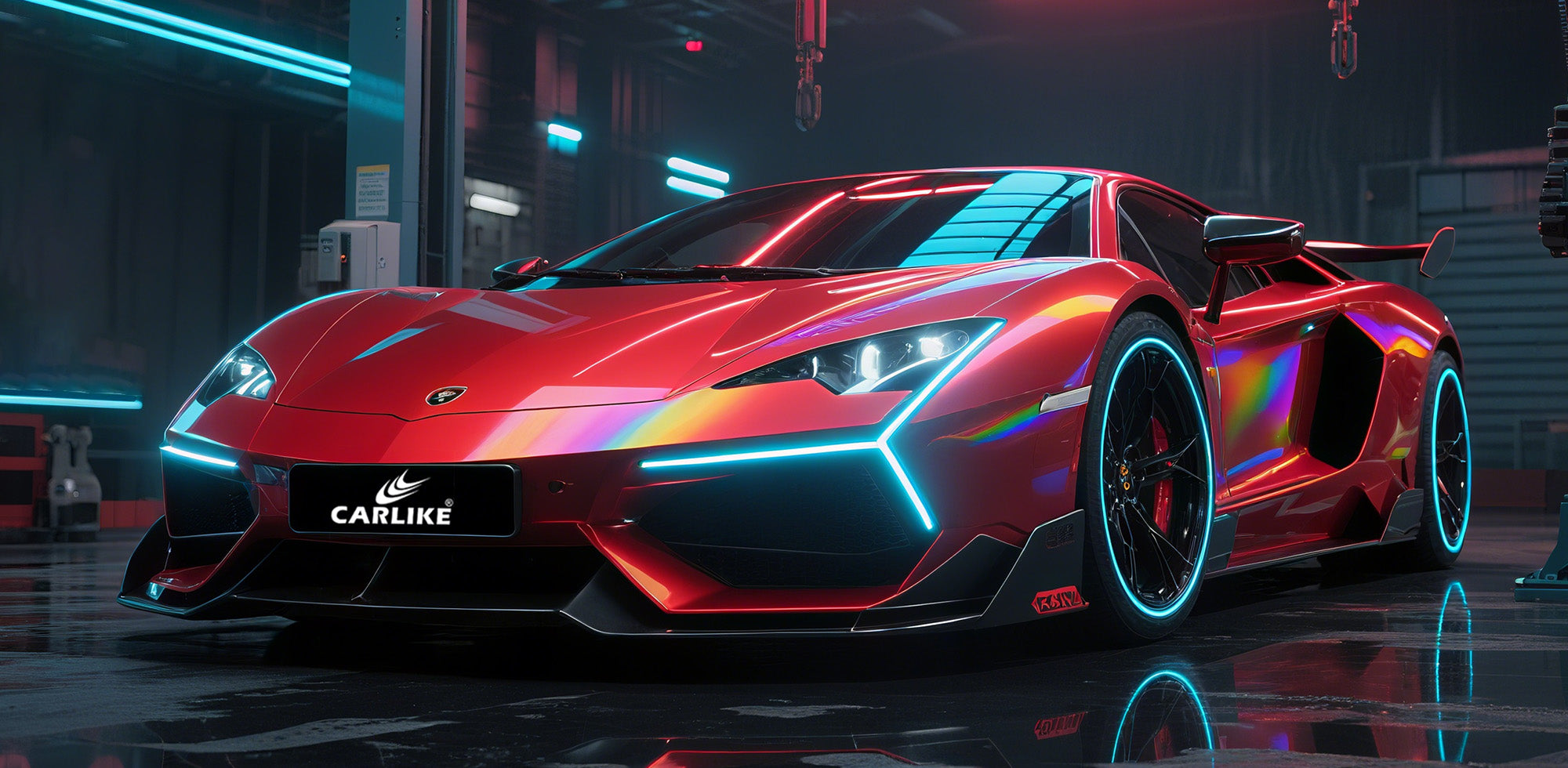ABOUT CARLIKE
CARLIKE® launched in 2012, mainly focus on premium car wrapping vinyls, with rich colors and stylish designs. High performance with economic price is always the persuit of CARLIKE®.
CARLIKE-Make Your Car Special.
1. Introduction
A car wrap is a vinyl material applied over the original paint of a vehicle to change its appearance temporarily or permanently. It's popular because it allows for customization with various colors, patterns, and finishes without the permanence of paint. Car films also offer protection to the underlying paint from scratches and UV rays.
The key question often asked about car films is how long they last before needing replacement or maintenance. This depends on several factors such as the quality of the vinyl used, installation quality, environmental conditions, and how well the vinyl is maintained. Addressing this question involves understanding the lifespan expectations and maintenance practices to maximize durability and appearance.

2. Factors That Affect Car Wrap Longevity
Several key factors determine how long a car vinyl will last on a vehicle. Understanding these can help you maximize the lifespan of your film and maintain its appearance for as long as possible. Here’s a closer look at the most important considerations:
The Quality of the Wrap Material
The type of vinyl used plays a significant role in determining the longevity of the vinyl. High-quality vinyl film materials from trusted manufacturers, like 3M or Avery Dennison, tend to be more durable and resistant to environmental damage. These premium materials can last up to 5–7 years or more, depending on other factors. On the other hand, lower-quality films may degrade more quickly, showing signs of fading, peeling, or cracking after just a couple of years. Investing in a top-tier film material is essential if you want long-lasting results and vibrant colors.
The Skill of the Installer
Even the best vinyl material won’t last long if it’s not applied correctly. Professional installation is crucial for ensuring the vinyl adheres smoothly to the vehicle’s surface, without bubbles, wrinkles, or loose edges. An experienced installer will take the time to properly prepare the vehicle's surface, ensuring any imperfections are addressed before applying the film. Poor installation can lead to lifting edges, peeling, or bubbling, which drastically shortens the lifespan of the vinyl. Opting for a skilled professional installer helps ensure that the vinyl not only looks good but also lasts as long as possible.
Maintenance and Cleaning Practices
How well the car film is maintained by the owner is another major factor affecting its longevity. Regular and gentle cleaning is essential to keep the vinyl looking its best. Dirt, debris, and contaminants left on the surface for too long can degrade the vinyl and lead to fading or damage. Owners should avoid abrasive cleaning tools and harsh chemicals, which can scratch or weaken the film. Instead, a mild detergent and a soft cloth should be used. Additionally, pressure washing should be done with care, as high-pressure water can lift the edges of the film. Proper maintenance extends the life of the vinyl by protecting it from everyday wear and tear.
Environmental Factors
The environment a vehicle is exposed to plays a significant role in determining the wrap’s lifespan. UV rays from the sun are one of the biggest enemies of vinyl wraps, as constant exposure can cause colors to fade and the material to weaken over time. Humidity and extreme temperatures also take their toll, with high heat causing the wrap to warp and peel in some cases. Additionally, pollution, salt, and acid rain can deteriorate the wrap’s surface if not cleaned regularly. Vehicles in harsh climates—such as those exposed to constant sun, extreme cold, or salty sea air—require more frequent maintenance, and the wrap may not last as long compared to those in milder environments.

3. How Long Does a Car Wrap Typically Last
The lifespan of a car wrap can vary depending on several factors, but in general, a well-applied and well-maintained car film typically lasts between 3 to 7 years . The longevity of the vinyl depends largely on the type of material used, the conditions the car is exposed to, and how the vinyl is cared for. Here's a breakdown of lifespan expectations based on different types of films:
1. General Lifespan Expectations (3 to 7 Years)
Most high-quality vinyl films from trusted brands, like 3M or Avery Dennison, can last between 5 to 7 years, provided they are installed properly and maintained with care. However, films exposed to harsher environmental conditions, such as constant sun or extreme weather, may experience fading, peeling, or deterioration sooner, around the 3- to 5-year mark.
For example:
- City driving with moderate weather exposure may lead to a film lasting closer to 7 years.
- Constant sun exposure or harsh climates may reduce the film’s lifespan to the lower end of the spectrum, around 3 years.
2. Lifespan of Different Types of Wraps
The type of vinyl finish—whether matte, gloss, metallic, or satin—can also influence how long the wrap will last. Here’s how different finishes may affect longevity:
Matte Wraps : Matte finishes are popular for their sleek, non-reflective look. However, they tend to be slightly more prone to showing signs of wear, such as scratches or scuffs, which may reduce their overall lifespan. On average, matte films last around 4 to 6 years with proper care.
Gloss Wraps : Gloss wraps tend to last longer than matte wraps due to their smooth, shiny surface, which can better withstand the elements. They are generally easier to maintain and can last between 5 to 7 years if well-maintained.
Metallic Wraps : Metallic wraps have a unique reflective finish but may not last as long as other types. The reflective properties of metallic wraps can make them more prone to sun damage, causing them to fade quicker. Their lifespan is typically around 3 to 5 years, depending on the level of exposure to UV rays.
Satin Wraps : Satin wraps fall between matte and gloss in terms of appearance and durability. They offer a semi-gloss finish and can generally last around 5 to 7 years with regular maintenance.

4. Maintenance Tips to Extend Car Wrap Lifespan
Proper maintenance is crucial for ensuring that your car wrap stays vibrant and intact for as long as possible. Here are some essential tips to help extend the lifespan of your car wrap:
1. How to Properly Wash and Care for a Car Wrap
Regular washing helps prevent dirt, grime, and contaminants from settling into the vinyl wrap, which can cause long-term damage or dull the finish.
- Hand washing is ideal : Use a soft sponge or microfiber cloth and mild soap to gently wash the car. Avoid using abrasive materials that could scratch the wrap.
- Avoid automatic car washes : Brush-type car washes can be too rough and may cause peeling or scratches on the wrap. If using an automatic wash, opt for a brushless one.
- Rinse thoroughly : After washing, make sure to rinse off all soap and dirt thoroughly to avoid residue buildup.
- Dry with care : Use a microfiber towel to dry the wrap, ensuring there are no water spots left behind.
2. Avoiding Extreme Weather Exposure
While car wraps are designed to withstand the elements, constant exposure to extreme weather conditions can shorten their lifespan.
- Protect from UV rays : Prolonged sun exposure can cause the wrap to fade and crack over time. Whenever possible, park your vehicle in shaded areas, such as a garage or under a carport. Alternatively, using a car cover can also shield it from direct sunlight.
- Avoid extreme heat and cold : Excessive heat can cause wraps to warp or peel, while extreme cold can make the vinyl brittle. Try to avoid parking your car in direct sunlight for long periods or leaving it outside in freezing temperatures for too long.
- Clean off harmful contaminants : Bird droppings, tree sap, and bug splatter can be highly acidic and may degrade the vinyl if left on for too long. Clean them off promptly with a soft cloth and mild cleaner.
3. Using Protective Waxes or Specialized Car Wrap Protection Products
Using protective products can help maintain the look of your wrap and provide an extra layer of protection.
- Avoid traditional car wax : Regular waxes designed for painted surfaces can damage vinyl wraps, especially matte finishes. Instead, use waxes specifically formulated for vinyl wraps.
- Use protective sealants : Vinyl wrap sealants or ceramic coating products can provide a protective barrier, making it easier to clean the surface and protect against contaminants.
- Consider UV protection sprays : Some sprays are designed to protect vinyl wraps from UV rays, helping to prevent fading and cracking due to sun exposure.
4. Avoid High-Pressure Washing
While pressure washing can be a convenient way to clean your vehicle, using high-pressure water on a vinyl wrap can cause the edges to lift and the material to peel.
- Use low pressure : If you must use a pressure washer, ensure the water pressure is low and keep the nozzle at least 12 inches away from the surface.
- Avoid direct spraying on edges : Be mindful not to spray directly on the edges or seams of the wrap to prevent lifting or peeling.
5. Regular Inspections
Periodically inspect the car wrap for any signs of wear, damage, or bubbling. Early detection of small issues, such as lifting edges or minor scratches, allows you to fix them before they worsen and shorten the wrap’s lifespan.





